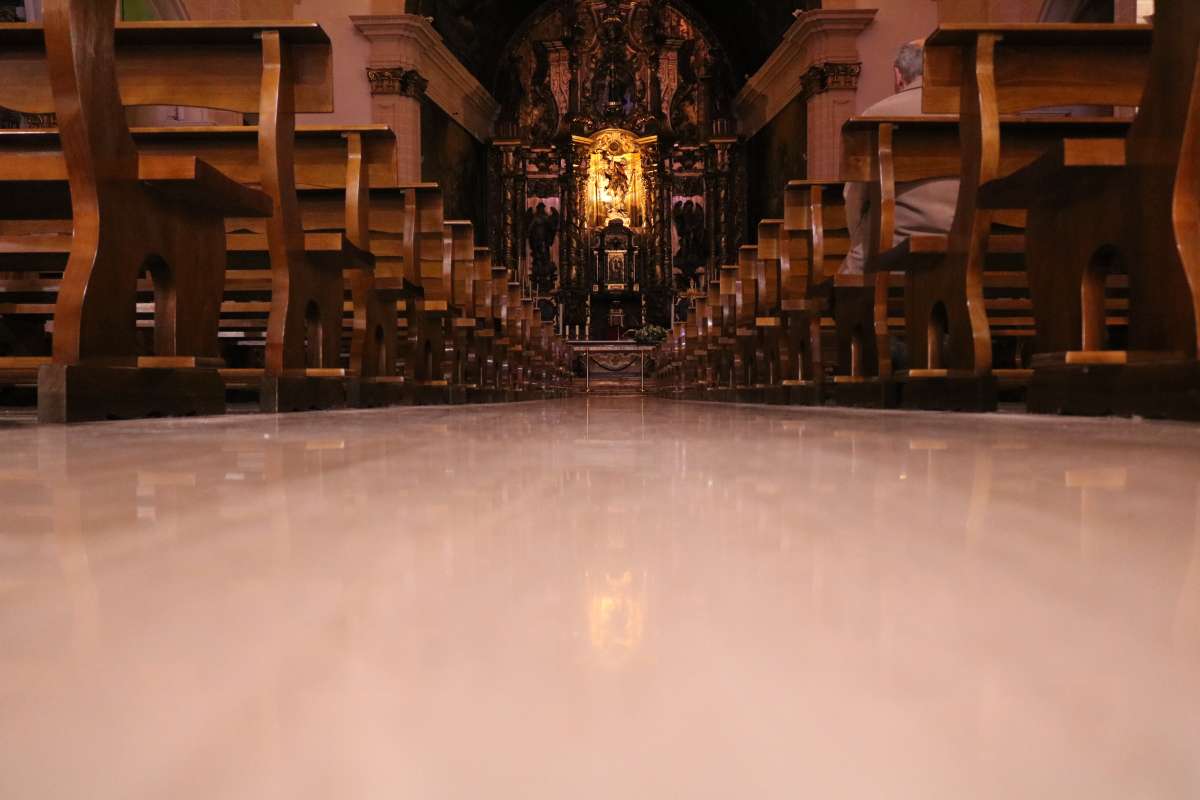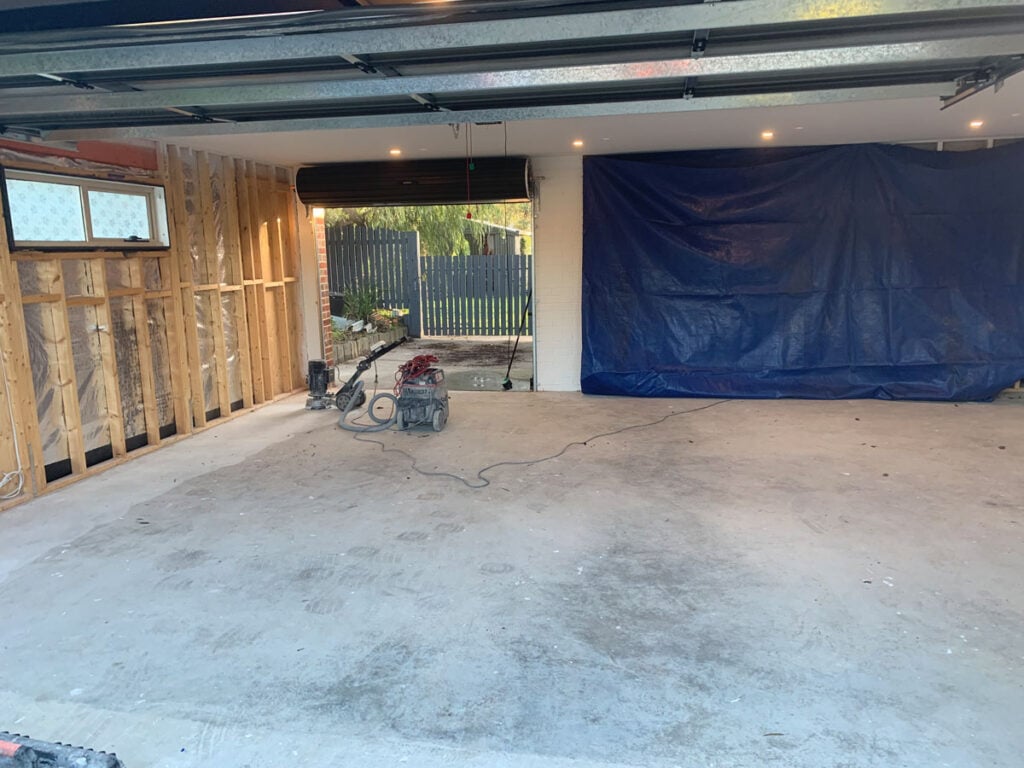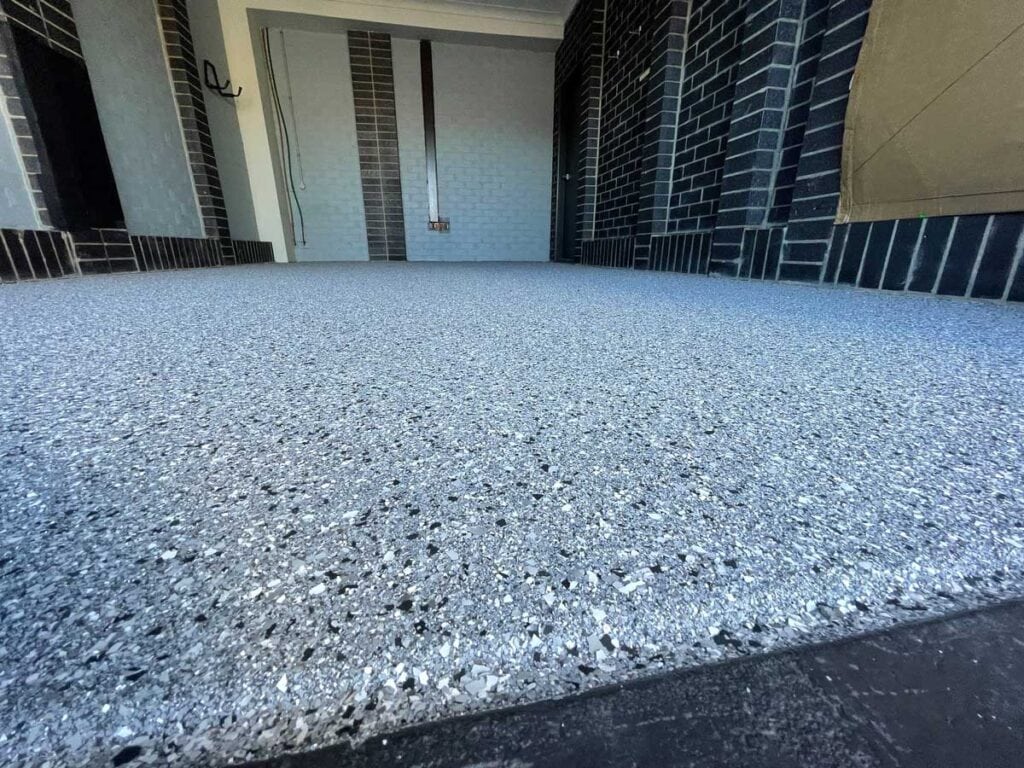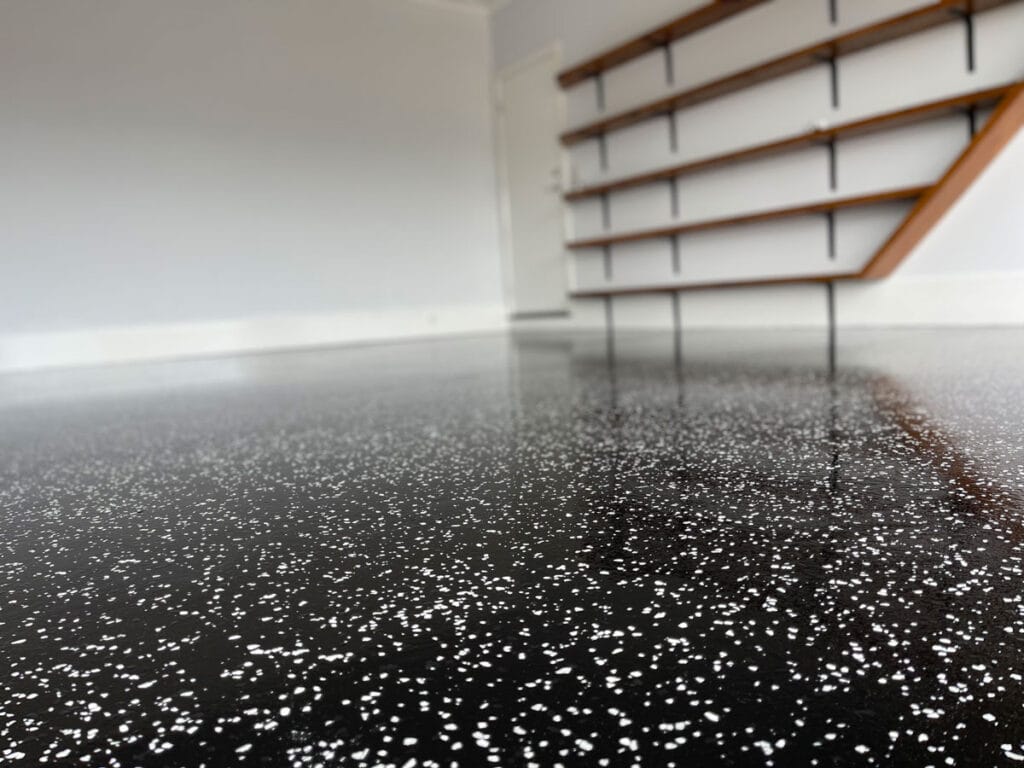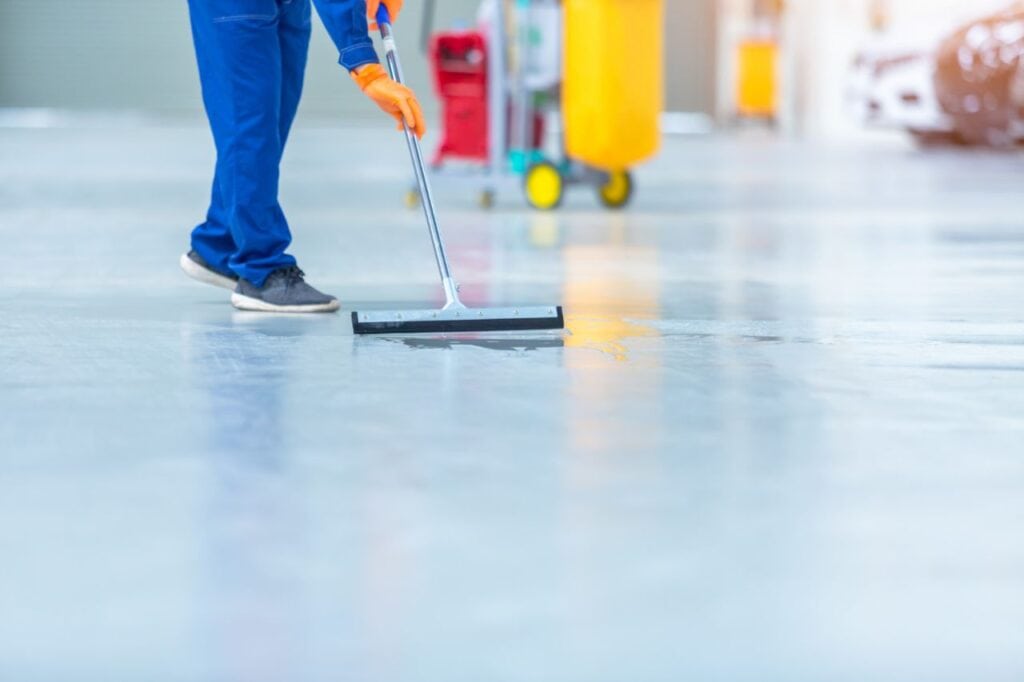Epoxy coating the floor is a choice worth considering if you want to improve the basement's utility and looks. Storage, play, and even the occasional home office can all find a comfortable home in the basement.
The concrete flooring, while sturdy, can be cold to the touch and difficult to keep clean. Epoxy coatings are ideal for these situations. This durable and aesthetically pleasing flooring option may do wonders to improve the look and functionality of your basement.
Epoxy coating presents a strong argument for homeowners who want to improve their basements in terms of longevity, moisture resistance, ease of maintenance, and aesthetic appeal. This post will discuss why epoxy coating your basement floor is a smart decision and how it can enhance your life in the basement.
How Epoxy Flooring for Basements Works
To ensure the proper installation of an epoxy floor, it is necessary to diamond grind the concrete surface, allowing for the bonding of the epoxy and moisture vapour barrier to the concrete. However, this process requires careful consideration due to the weight of the industrial grinding machines, which can exceed 1,000 pounds. Accessibility to the basement is crucial, as it determines whether the machines can be easily transported or need to be carried down steps.
The issue of accessibility often poses a significant challenge for basement floors. Another important factor to consider is the odour of the chemicals involved in the epoxy application. Selecting the appropriate products and ensuring proper airflow within the basement is essential. We recommend turning off the HVAC system while the epoxy chemicals are applied. Although epoxy flooring applications in basements present unique challenges compared to other types of floors, they can still provide the best solution with the help of an experienced epoxy flooring contractor.
Epoxy has gained popularity and is widely installed in numerous residential and commercial spaces thanks to its exceptional qualities that enhance concrete surfaces. Consisting of a resin and a chemical hardener, these components are mixed according to the manufacturer's instructions. The solution then undergoes a chemical reaction to cure and form a durable layer, serving as the floor surface. Epoxy is commonly used in garages, kitchens, hospitals, schools, and industrial environments, making it equally effective as a flooring solution for basements. Let's explore the reasons behind its suitability.
Basement Epoxy Floor Benefits
Epoxy floors often evoke memories of hockey, a beloved sport among many children. Even before they can skate, kids practice stick handling and shooting in their basements with friends. In my childhood neighbourhood, the pick-up team always preferred the basement with an epoxy floor, which is likely why the team captain's house was chosen as the venue.
The epoxy floor in that basement was incredibly smooth, providing an ideal surface that mimicked the feel of real ice without the slipperiness of polished concrete or laminate. It offered the perfect amount of traction for safe gameplay. Additionally, the durability of epoxy meant that our play was never interrupted by holes, cracks, or crumbling concrete. The cheerful cream-coloured surface added to the enjoyment of our games.
An epoxy basement floor holds numerous benefits for adults, regardless of whether the basement is used for utility, recreation, or living space. It is among the easiest flooring types to install and effectively addresses common humidity issues often encountered in basements. Furthermore, its longevity ensures that it will withstand the test of time.
Epoxy Is Waterproof
Basements are particularly vulnerable to flooding and leaks, making flooring choices crucial in mitigating potential damage. If traditional materials like wood, carpet, or tile are installed, and a flood or leak occurs, the flooring will likely be damaged and require replacement. However, opting for an epoxy coating offers several advantages in such situations.
Unlike unsealed concrete, which absorbs moisture, an epoxy coating effectively prevents moisture from seeping through. It acts as a waterproof barrier, making water remediation faster and easier. Eliminating moisture reduces the growth of bacteria, mould, mildew, and fungus, promoting a healthier environment in the basement. Additionally, epoxy flooring is generally more cost-effective than many other flooring options. Area rugs can be placed on the epoxy surface to add warmth and style.
Protect from Moisture
While garages may not be prone to frequent flooding, basements are known for their susceptibility to water-related issues. During heavy rain seasons or when the snow melts rapidly in the spring, basements can experience flooding. The typical concrete floors in basements can allow water to seep through, leading to potential damage. However, an epoxy floor application in your basement provides a moisture-resistant solution. Epoxy acts as a protective barrier for the underlying concrete, preventing moisture from seeping into your basement. This added protection safeguards your basement from potential flooding and water-related issues.
Greener Than You Think
Two-part epoxy consists of two components: a resin and a hardener. While some liquid epoxy products can release strong and unpleasant fumes, the hardener plays a crucial role in the chemical reaction during curing. This reaction transforms the resin molecules (monomers) into long chains (polymers).
To ensure safety during application, wearing a respirator to prevent inhalation of fumes is recommended. It is also advised to turn off the HVAC system and open windows for proper ventilation. Once the epoxy coating has fully cured, it is safe for everyone in the household.
Another environmentally friendly aspect of epoxy is its long-lasting nature. Unlike vinyl tiles or laminates, epoxy does not need to be removed and discarded, reducing waste and preventing landfill congestion.
Easy Basement Cleaning
An easy-to-clean floor can greatly enhance the comfort and functionality of your living space, whether you're utilising your basement for storage or as an extended living area. Unlike bare concrete floors, an epoxy-coated floor offers the advantage of being resistant to dust and dirt accumulation. If you're seeking a low-maintenance solution for keeping your basement clean, epoxy flooring is an excellent choice.
With an epoxy-coated floor, you can effortlessly sweep or vacuum away dust and dirt, ensuring a tidy environment with minimal effort and time. Additionally, any spills can be easily cleaned up using a damp mop. Thanks to the impermeability of epoxy coatings, fluid spills will remain on the surface, allowing you to wipe them away with a towel or cloth quickly. This convenience adds to the appeal of epoxy flooring as a practical and efficient option for maintaining a clean and pristine basement.
Installation is DIY-able
While applying epoxy flooring requires more effort than simply rolling paint onto the floor, it is not necessarily a task that requires a professional. With some preparation and attention to detail, you can achieve satisfactory results.
Before applying the epoxy coating, you must address any large cracks and holes in the floor using hydraulic cement. Smaller cracks can be filled with caulk. Additionally, if the concrete surface is smooth, it is recommended to etch it using a floor buffer and a diamond-grit sanding screen. This step ensures proper adhesion of the epoxy coating.
Once the necessary preparations are complete, you can proceed with the application. It's worth noting that you don't necessarily need a two-part epoxy product. Water-based epoxy floor coatings are available in the pre-mixed form, ready to be applied straight from the can. This simplifies the process, as there is no need for mixing different components.
Strong and Durable
An epoxy floor application with strength and durability in the garage is also a reliable basement choice. Basements are frequently transformed into "man caves" or recreational spaces for teenagers, requiring a floor that can withstand the weight of various furniture and activities.
With an epoxy floor, you can confidently accommodate heavy items like couches, chairs, and even pool tables, as it provides exceptional resilience. The robust nature of epoxy ensures that the floor can withstand the pressures and impacts associated with these items without showing signs of wear for many years.
By choosing an epoxy floor for your basement, you can enjoy a long-lasting and durable surface that can withstand the demands of your desired activities and heavy furniture. Its strength and resilience make it an ideal flooring solution for creating a functional and inviting space in your basement.
Mould Resistant
Due to the cool and inadequate ventilation typically found in basements, condensation can accumulate and create an environment conducive to mould growth. However, epoxy flooring, being non-porous, eliminates the opportunity for mould spores to take root and thrive. Therefore, an epoxy floor is highly resistant to mould and provides a mould-free environment in your basement.
It is important to note that while epoxy flooring prevents mould growth, rugs on top of the floor can still be susceptible to mould development. To mitigate this risk, it is recommended to periodically take the rugs outside and expose them to sunlight for drying. By doing so, you can effectively eliminate moisture and minimise the potential for mould to grow underneath the rugs.
By choosing epoxy flooring for your basement, you can enjoy the added assurance of a mould-free space. Just remember to maintain proper care and attention to any rugs or carpets placed on the floor to prevent mould growth in those areas.
It Blocks Radon Gas
Given the proximity of basements to the ground, there is a potential risk of radon emissions. Whether you have plans to finish your basement or not, consider applying an epoxy coating as a protective measure against radon gas. The impermeable nature of epoxy can help prevent radon gas intrusion into your basement.
Additionally, regardless of whether you choose to have an epoxy coating, installing a radon detector in your basement is highly recommended. This device will continuously monitor the radon levels and provide early detection of any potential issues with radon gas. By being promptly alerted to elevated radon levels, you can take necessary measures to address the situation and ensure the safety of your living environment.
By considering an epoxy coating and implementing a radon detector, you can effectively mitigate the risk of radon gas and maintain a safer and healthier basement space.
Sleek Finish
Epoxy flooring provides practical benefits and a visually appealing upgrade for your basement, transforming it into a sophisticated and stylish space. With its sleek and lustrous shine, epoxy flooring can enhance the overall aesthetic of your home.
One of the advantages of epoxy flooring is its versatility in design options. It is available in a wide range of colours and patterns, allowing you to choose a finish that seamlessly complements the existing aesthetic of your home. Whether you prefer a subtle, understated look or a bold and vibrant statement, epoxy flooring can be customised to suit your preferences.
To enhance the visual impact further, you can incorporate decorative elements such as marble chips, pumice flakes, or other design additives. These elements can add texture, depth, and uniqueness to your epoxy floor, making it stand out and a focal point in your basement.
Versatile Epoxy Coatings
Whether you're looking to enhance the appeal of your basement for everyday use or want to create a more welcoming environment for occasional visits, epoxy floor paint offers unmatched versatility as a flooring option. With a wide range of coating options, you can explore endless possibilities regarding colours, combinations, and artistic application techniques.
By choosing epoxy floor paint, you achieve a stylish and aesthetically pleasing look and benefit from its exceptional durability. The coating is designed to withstand the test of time and is resistant to slips, scratches, and impacts, ensuring that your basement floor remains in top condition even with regular use.
In addition to its durability, epoxy floor paint provides practical advantages. It offers excellent waterproofing properties, protecting your basement from moisture-related issues. Furthermore, it is resistant to chemicals and stains, ensuring that accidental spills or mishaps won't leave a lasting mark on your floor.
With epoxy floor paint, you can transform your basement into a space that suits your needs and preferences, whether it's for laundry, storage, or daily activities. Its versatility, durability, and resistance to various types of damage make it a reliable and attractive choice for creating a functional and visually appealing basement environment.
Challenges of Basement Epoxy Flooring
Epoxy is a material with high performance, but only when installed correctly. Inadequate installation can result in several issues that could leave you with regrets. It won't function properly, won't look as good, will need to be replaced, and, worst of all; it gets in the way of removal once it's in place. This means that, especially for your basement floor, you must involve professionals in the installation process. Common problems with improperly installed epoxy include:
- Peeling can occur when epoxy is applied outside or in a cold basement. This is brought on by inadequate cleaning of the concrete surface, which leaves oil, grease, and debris.
- Wet floors bring moisture bubbles under installations on. Clean etched concrete first and wait 24 hours before applying the epoxy. Good contractors quickly dry out the site. Your contractor should conduct a moisture test to determine whether your basement needs epoxy.
- Air Bubbles Under Installation - Improper surface preparation or exposure to direct sunlight in a cold environment can result in air bubbles under epoxy installations. Because of this, we assess the position before applying and, during cold weather, use poly aspartic epoxy.
- Colour Inconsistency - If the mixing process isn't done correctly, expect a mismatched floor. This can also be brought on by unprepared concrete floors with oil and grease buildup.
The majority of issues with epoxy flooring for basements are the result of shoddy construction. Those who fall victim to this try to do the work themselves to save money but fail miserably. Getting professionals involved will help you avoid this. Even if your floor was recently installed, a flooring specialist would recognise the need to prepare it properly. Additionally, they will employ high-quality materials and use them properly.
Conclusion
Basements can benefit from epoxy coating because it is a long-lasting flooring solution that also looks great. The heavy industrial grinding machines, the limited basement access, and the pungent epoxy application chemicals all need for careful planning. It is a popular choice for flooring in garages, kitchens, hospitals, schools, and industrial settings, and it works just as well in basements. Epoxy coating's many benefits include its durability, resistance to moisture, low maintenance requirements, and attractive appearance. Epoxy flooring is a common alternative for basements because it is durable, affordable, and impervious to water and moisture.
They also offer a slippery-free alternative to polished concrete or laminate, providing a surface that is as smooth as actual ice. In addition to being more budget-friendly than other flooring solutions, epoxy flooring also allows for the addition of warmth and style. Epoxy flooring is also better for the environment than other flooring solutions since it inhibits the growth of microorganisms like bacteria, mould, mildew, and fungi. The epoxy resin and hardener are the two parts of a two-part epoxy. Wearing a respirator and turning off the air conditioning and heating system are both good safety measures to take before beginning the application.
It's good for the planet because it doesn't generate any waste from removal and disposal or add to the overflowing of landfills. Because it does not trap dust and filth, epoxy flooring makes it simple to keep a basement clean; just mop it up with water. With the right amount of planning and focus, you can install it yourself. Epoxy floor coatings that cure in water come in a ready-to-use condition. Epoxy flooring is a great option for a basement because it is water and mould-proof, as well as robust and long lasting.
It's also a good choice for basements because it can resist the wear and tear of heavy foot traffic and furnishings for an extended period of time. It is also effective at preventing the entry of radon gas thanks to its impermeable nature. In addition, having a radon detector down in the basement is something you should seriously consider doing. The most critical information here is that epoxy flooring is a functional and aesthetically pleasing upgrade for your basement and that epoxy floor paint provides unparalleled versatility. It's customisable and comes in a wide variety of colours and designs.
Epoxy floor paint is not only stain- and chemical-resistant but also provides great waterproofing to keep your basement dry. Finally, epoxy floor paint can help you make your basement into a functional and attractive living place. Epoxy flooring is a dependable and aesthetically pleasing option for making a basement space that serves its purpose and looks well. However, peeling, air bubbles, and inconsistent colours might result from sloppy installation. To avoid these problems and guarantee the floor is properly prepared and used, it is important to have professionals assist with the installation procedure. They should check the basement for dampness to see if epoxy is necessary.
Content Summary
- Epoxy coating enhances the utility and appearance of your basement floor.
- Concrete floors can be cold and difficult to clean, making epoxy coatings an ideal solution.
- Epoxy coating offers longevity, moisture resistance, easy maintenance, and aesthetic appeal.
- Proper installation of epoxy flooring involves diamond grinding and consideration of accessibility.
- Odour control and proper airflow are important during epoxy application in the basement.
- Epoxy's qualities make it suitable for residential and commercial spaces, including basements.
- Epoxy floors provide a smooth and safe surface for recreational activities.
- The durability of epoxy prevents interruptions caused by cracks or concrete damage.
- Epoxy coating addresses common basement humidity issues.
- It acts as a waterproof barrier, preventing moisture damage and facilitating water remediation.
- Epoxy flooring is cost-effective and environmentally friendly.
- Epoxy-coated floors are easy to clean, reducing dust and dirt accumulation.
- Sweeping or vacuuming dust and dirt is effortless with epoxy flooring.
- Spills on epoxy floors can be easily wiped away with a damp mop.
- Epoxy floor installation can be a DIY project with proper preparation.
- Epoxy flooring withstands heavy furniture and activities in the basement.
- It is resistant to mould growth, promoting a healthier basement environment.
- Epoxy acts as a protective barrier against radon gas intrusion.
- Epoxy flooring enhances the aesthetic appeal of your basement with a sleek finish.
- Design options for epoxy flooring are versatile, allowing for customisation.
- Epoxy floor coatings are durable, slip-resistant, and scratch-resistant.
- Epoxy coatings protect against moisture-related issues and chemical stains.
- Proper installation is crucial to avoid issues like peeling, wet floors, air bubbles, and colour inconsistency.
- Professionals should be involved in the epoxy installation process to ensure quality results.
- Epoxy flooring is a reliable choice for creating a functional and visually appealing basement space.
- Epoxy coatings make basement cleaning and maintenance easier.
- Epoxy coating provides a long-lasting and durable basement floor solution.
- Epoxy flooring is resistant to bacteria, mould, mildew, and fungus growth.
- It offers protection against potential flooding and water-related damage.
- Epoxy coating can transform your basement into a comfortable and inviting living area.
Frequently Asked Questions
The longevity of an epoxy floor system will vary based on thickness, use and maintenance. Typically, epoxy floors last between 10 and 20 years, much longer than a painted concrete floor, which will chip and wear quickly in high-traffic areas.
Epoxy is virtually waterproof to protect the floor beneath it from moisture. If your basement is damp, protecting each part of the structure from moisture is important, as mould and mildew can begin to thrive in this environment.
Concrete flooring can be the least expensive in a basement because it's already there. You can clean it, grind down some rough spots, and call it good. You can always throw rugs or carpet tiles to add warmth and softness to specific areas.
We recommend avoiding hardwood and laminate flooring for basements unless you have a fairy-tale basement with zero moisture. They may look great and match the flooring in the rest of your home, but wood and laminate are prone to mould and water damage, which can cause them to warp.
Clean up spilled gas immediately because it will damage the surface of an epoxy floor if allowed to sit for too long. Paint, household cleaners and other abrasive liquids must be cleaned immediately.


